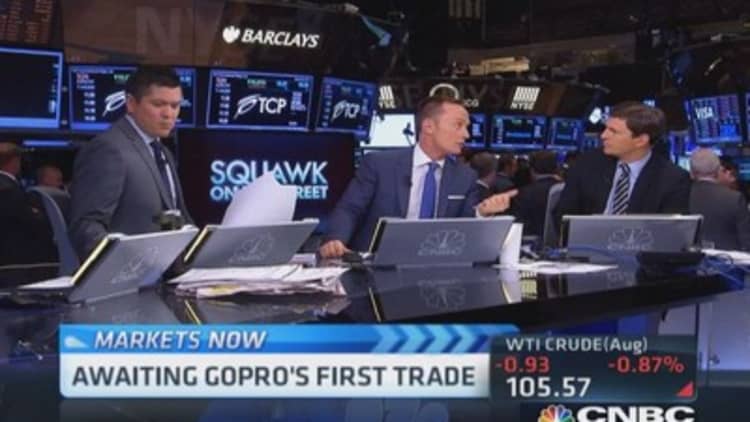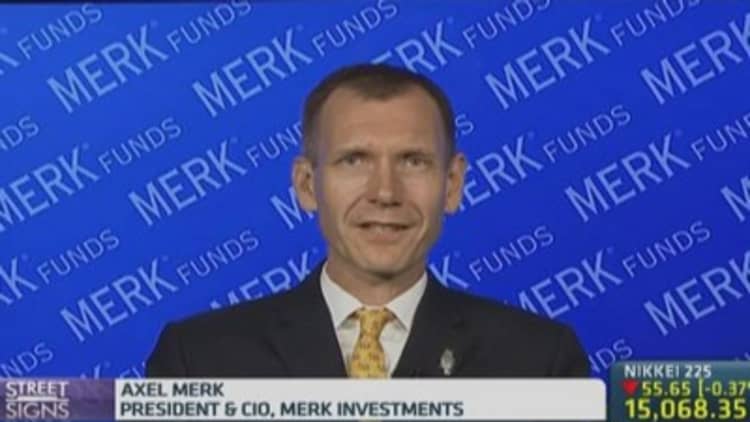It was a tantalizing introduction. Bill Gross, Pimco's "Bond King" and founder of the world's largest fixed income fund, promised to impart the secrets of his extraordinary success to an audience of financial advisers in Chicago. "I'll be handing you the keys to the Pimco Mercedes," he told them.
Read More Low volatility is a myth...and that's good news
Unlike smaller fixed income funds that might just buy and sell bonds, the $230bn Pimco Total Return fund is a clever user of derivatives trading strategies, Mr Gross went on to explain, and Pimco is one of the biggest sellers of insurance against market volatility.
For investors who don't want the value of their bond portfolio to move around too much, his fund is on hand to provide insurance that will pay out if there is a market shock – in return for a premium of course.
"Sounds dangerous and is sometimes," Mr Gross said. "Obviously, the volatility has to be underwritten properly and priced appropriately. It doesn't pay to write flood insurance before a flood, but over time it has been a very respectable structural template alpha generator."
Read MoreDon't sweat the low volatility in this market—Commentary
In fact, so many different kinds of investors are now "selling volatility" that BlackRock's Dennis Stattman worried at the same conference that it had become a "crowded trade." Skeptics worry these new players might be selling flood insurance on the cheap, just before a deluge.
Meanwhile, Mr Gross is putting a focus on the Total Return fund's use of derivatives at a time when regulators around the world are considering systemic risks that might be posed by large mutual fund managers. Former Read MoreFederal Reserve governor Jeremy Stein warned last year that insurance sales by asset managers might be introducing unobserved risk into the financial system.

Raymond Nolte, managing partner at SkyBridge Capital, a fund of hedge funds, says he has never been a big fan of selling volatility. "It's like writing hurricane insurance because we haven't seen one for a while. If you want to sell premium you should do so when volatility is high, not near historic lows."
Mihir Worah, a deputy chief investment officer at Pimco, says the firm was selling ahead of this year's decline in volatility. "Obviously at these levels we are not selling volatility aggressively," he told the Financial Times.
Vol, as the traders call it, has effectively become an asset class unto itself, although trading it is more complicated than buying or selling stocks and bonds. It is more complicated, too, than buying and selling insurance as generally understood by anyone with a fire or flood or car insurance policy.
Read More The 'death of volatility' forces traders to get creative
Selling volatility typically involves selling options, which would pay out if a particular market moved by more than a pre-agreed amount. The Vix index, sometimes referred to as the stock market's "fear gauge," is based on the price of a combination of options on the S&P 500. The more investors are paying to protect themselves from big swings, the higher it goes. The fixed income market has a similar gauge called the Move index.
Both are close to historic lows, and traders are in the midst of a vigorous debate about why. The economic recovery and central bank support for markets suggest big swings may be unlikely. But some traders think vol may be priced too low for technical reasons, too, such as the retrenchment of bank trading desks and resulting illiquidity, or an imbalance between supply and demand.
According to Maneesh Deshpande, head of equity derivatives strategy at Barclays, the demand for protection from volatility has soared, but the supply from people selling insurance has soared even more.
"Premium has declined to the levels prevalent in the 2004-2006 period, so we call it the 'old normal' – but with a twist," Mr Deshpande said.

The twist is that a host of new players are in the market, trading a host of new volatility products. More than a half-dozen exchange-traded products allow hedge funds and retail investors to short the Vix. Trading in options is buoyant, with open interest near a record level.
The attraction of selling vol is that, over several decades, payouts have been less than the money investors have taken in through premiums. The volatility implied by the price of options has never been fully realised in the actual, subsequent movement of the stock or bond markets.
Howard Tai, analyst at Aite Group says in a world of low returns, it is an attractive strategy for some investors. Pension funds have joined the sellers, attracted to the premium income at a time when bonds are yielding a pittance. The question is how many will be carried out if vol spikes and their losses are more than they can afford.
Read More Low market volatility—a plus or storm ahead?
"If there is a flare up that causes volatility to jump, you will have a scramble at that point as sellers will need to buy it back," says Mr Tai.
Mr Gross told his audience that such flare-ups can lead to bouts of underperformance for his fund, but it is a short-term price worth paying.
"Why are people willing to pay for insurance?" he said. "They want to sleep at night. And so at Pimco we're willing to sell that insurance. We're willing to sleep less, but perform better."
—By Stephen Foley and Michael Mackenzie, the Financial Times

